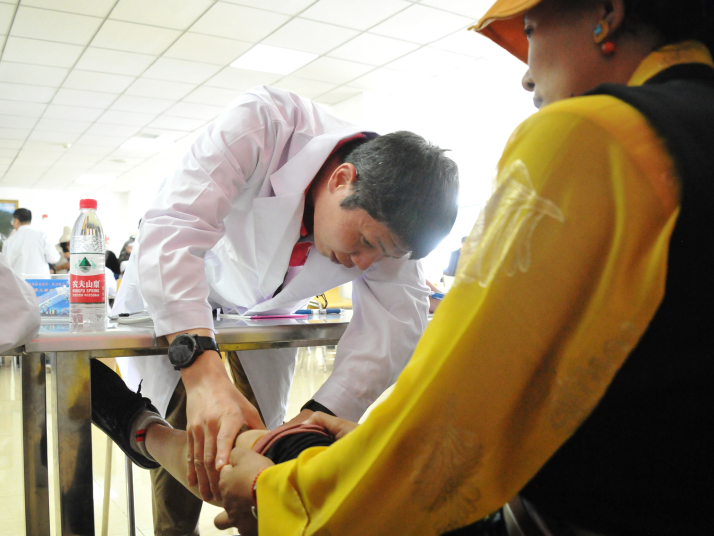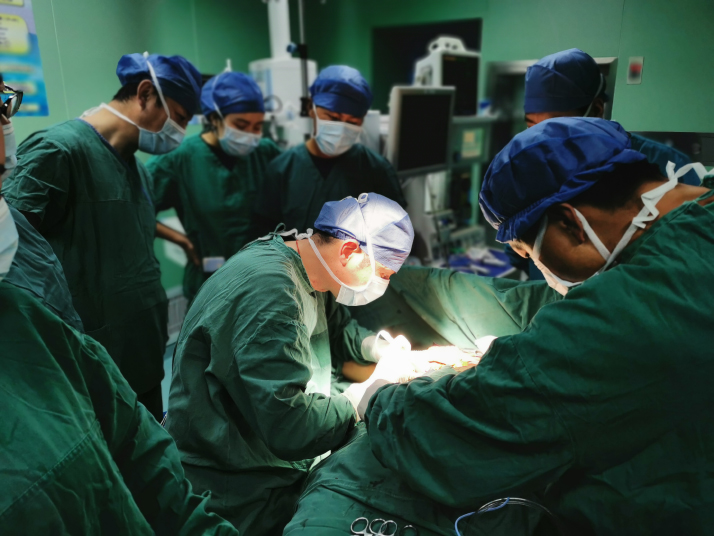| China |
| A Shanghai doctor gives back to herdsmen by serving them in Tibet | |
|
|
|
|
|
The drain in Zhou Jian's bathroom is clogged with hair again. The 48-year-old has a buzz cut and lives alone, but he said the drain blocks twice a month. "It never happened when I was in Shanghai. I'm losing my hair much faster on the plateau," Zhou, Vice President of the Xigaze People's Hospital in Tibet Autonomous Region, southwest China, told Beijing Review. With an average altitude of 4,000 meters above sea level, Xigaze is the second largest city in Tibet. Zhou, a surgeon specializing in breast and thyroid treatment at Huashan Hospital in Shanghai, arrived there in July 2019 as part of a three-year medical assistance program. When asked why he chose to come to Tibet, Zhou said he wants to repay the help of the Tibetan herdsmen who helped him a decade ago. During a road trip to Mount Qomolangma in April 2009, Zhou's car broke down, stranding him in a remote area. A local villager herding cows came up, so Zhou asked him for help. "He may have been able to understand me, but I had no idea what he was saying," Zhou recalled. The herdsman left after the short and ineffective attempt at communication. The weather was chilly and it was getting dark, Zhou said. "We felt helpless. We were surrounded by highland barley fields. The road was long and there were no other people in sight." To Zhou's surprise, the villager came back after about half an hour, bringing with him other villagers. The villagers helped Zhou fix the car, pushed it to help start it, and refused to take any money. "I was deeply touched," Zhou said. Impressed by the herdsmen's selflessness, Zhou decided to do something to help. "I know there is a big shortage of medical workers in Tibet, and it needs assistance from other regions of the country, so I signed up to join the assistance program," Zhou said.  Zhou Jian at work during free medical consultation for Tibetans in Xigaze on August 18, 2019 (COURTESY PHOTO)
Health facilitator Soon after his arrival, Zhou conducted a study on Xigaze's breast cancer cases over the previous five years. He found that many breast cancer patients in the area were diagnosed when already in the middle or advanced stages, when surgery is helpless. The Xigaze People's Hospital has the city's only molybdenum target mammography machine, which diagnoses breast cancer, but it was seldom used as local doctors were insufficiently trained on its operation. Worse still, there were no doctors specializing in breast and thyroid cancer treatment at the hospital prior to Zhou's arrival. It took Zhou six months to mentor local doctors on how to make diagnoses with the help of the machine. He also had local doctors assist him in his surgeries to learn his specialized techniques. Tsering Yardro, a 48-year-old Tibetan doctor, has been learning with Zhou for more than one year. "Zhou is very patient and easy going. Whenever we have questions or patients with complex symptoms, he comes to help us as soon as possible," she said. Zhou also visited county- and township-level hospitals in Xigaze, and plans to offer free lectures on the diagnosis and treatment of breast cancer soon. To raise public awareness of the disease, he has served as guest host of local radio health programs since September 2019 and made some household visits. "I hope people will begin to visit hospitals for examinations as soon as symptoms start," Zhou said. Last November, Zhou initiated a screening program for the early detection of breast cancer, offering subsidized treatment for patients in Xigaze in partnership with a medical assistance fund for Tibet and Shanghai Fudan University Education Development Foundation. Since its inception, one patient has received surgery under the program, and over 400 Tibetans have undergone breast cancer screening in the hospital.  Zhou Jian performs a breast cancer surgery at the Xigaze People's Hospital, Tibet Autonomous Region, southwest China, on October 23, 2019 (COURTESY PHOTO)
Targeted services Although there are fewer breast cancer patients in Xigaze than in Shanghai, the severe shortage of medical staff means each doctor and nurse needs to do the work of two. Zhou is no exception. In addition to playing the role of a surgeon, Zhou is also in charge of nursing and infection control at the Xigaze People's Hospital. He said not all Shanghai-style management methods are workable in Tibet. Take COVID-19 prevention and control for example. Zhou comes from the same Shanghai hospital as Zhang Wenhong, one of the best doctors in China's fight against COVID-19. At the very beginning of the epidemic, Zhou based his own COVID-19 prevention and control measures on those of Zhang's team. When patients see a doctor in Shanghai, they are allowed to bring only one accompanying person, and both must take nucleic acid tests as part of the hospital's precautionary measures. However, when one Tibetan is ill, the entire family may wish to accompany the patient to the hospital. Since the start of COVID-19, Xigaze has had no cases of infection and most local residents have not traveled out of the city. In view of this, Zhou decided not to limit the number of accompanying people and only the patient needs to undergo a nucleic acid test to reduce the financial burden on their family. Zhou's flexible and targeted management style is praised by his colleague, Wan Xingwang, a senior executive at the Xigaze People's Hospital. "Zhou always stands in others' shoes, so he has a good rapport with Tibetan staff and has won their support," Wan told Beijing Review. Wan added that Xigaze People's Hospital had updated it's precautionary measures after the National Health Commission issued new policies on nucleic acid testing on June 8, 2020. Now both patients and accompanying people who enter the hospital must get tested. Loss and gain During Zhou's service in Tibet, the most unforgettable moment came just two weeks after he arrived in Xigaze, when a member of his team passed away on July 30, 2019. The medical team from Shanghai originally had 24 members. The four veteran doctors on the team are to serve for three years like Zhou and the 20 younger ones for one year. Zhao Jian, a pediatrician from a children's hospital, was one of the 20. Just about to begin work in Xigaze, he died suddenly. He was 38. The high altitude and low oxygen environment were definitely contributing factors, according to Zhou. "I feel sad whenever thinking about him," Zhou said. What comforts Zhou is that the remaining 19 doctors on his team returned home in good health after one year of hard work. "I saw them off at the airport. That was the happiest moment for me in Tibet," he said. Before working in Tibet, Zhou had worked in Morocco for two years as a member of a Chinese medical team. "I have been dedicating more time to work than to my family," Zhou said. Zhou's wife Cao Tingting has to take care of the family on her own. "I am really grateful to my wife. She said no matter where I am, she will stand behind me as long as it is of benefit to patients," Zhou said. Zhou makes video calls to Cao and their 10-year-old daughter every day and buys gifts for them online on special days and festivals. Although sad to be parted from him, the daughter, Zhou Jiayi, understands her father's absence. "She knows that I left home to treat sick children in Africa and now in Tibet," Zhou said. "No matter where I am, my goal is to save more patients." BR (Print Edition Title: Love for Love) Copyedited by Garth Wilson Comments to linan@bjreview.com |
|
||||||||||||||||||||||||||||
|
